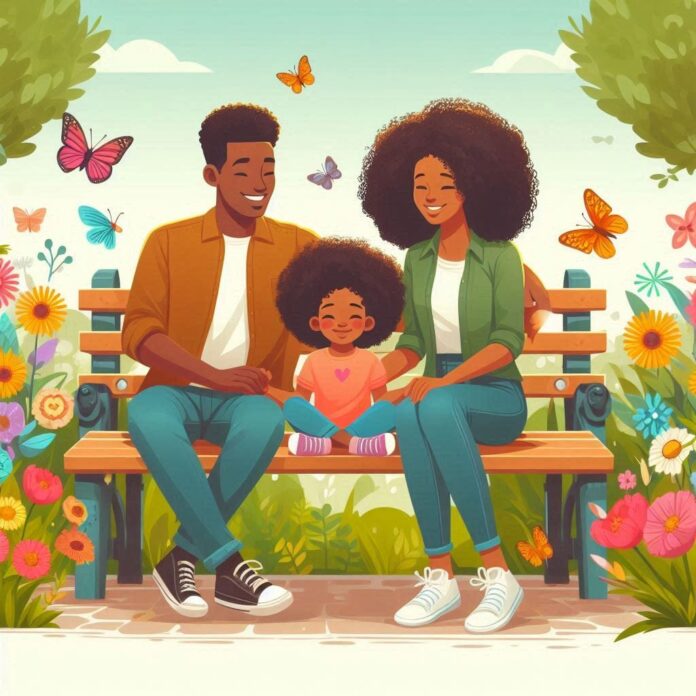Are you like me, a Parent or Guardian or Parental Figure? I would like us to have a conversation about our little ones. These ones are growing up so fast and doing so in a world that seems to be changing even faster than we can cope. Many of us call these tiny humans ‘Mini Me’. We can all agree that as they are growing and learning to talk, play with others they are on the path become the amazing people we pray that they are destined to be. To paraphrase Senator Okiya Omtatah who spoke recently in one of the discussions on X Spaces, “children should not be trapped by the poverty of their parents, but should be exposed to the wealth of the Nation.” The wealth of the nations includes wealth of values, character and aspirations. The children come to us through their parents yet belong to Kenya. Let’s reflect on how to nurture their confidence, creativity and inspiration as they grow out of the cradle and into their destinies.
Emotional Security: From the cradle or the baby cot, at the beginning of the Mini Me stage, the baby needs and responses to care, love and attention. It experiences the hugs, cuddles and kisses on the cheek as love, belonging and safety. Certainly, the baby grows and thrives with these experiences. We are obliged, as Mama na Baba to sustain the physical and emotional bonding. Then, the baby grows into a child who is confident, willingly explores their environment and is happy to establish a social connection with others. At the same time, the child is learning to regulate their own emotions. How often have we heard of terms such as Terrible Twos fly in the air? Can we use the phrases ‘Terrific Twos’ for the 2 years old or maybe ‘Tabasamu Tatu’ for the 3 year olds. Now, let’s be more intentional with baby/child care when we need the village to step in. To our nannies/ house managers or whoever is the child’s minder, choose to encourage the extra effort for them to show their understanding of being an active support in establishing that emotional security. This depends on the family set up ergo the parents need to be the best example and very alert to how the baby or child responds to other caregivers. It really takes the village to raise the child.
Fact: The first years of child’s life from ages 0-8 are very important.
Question: Did you realize that taking care of a baby is like laying a foundation of a house?
When the foundation is strong, the whole building stands tall. When the nurturing of a baby is intentional then the evidence of this will speak for itself at every stage of the child’s development. With that in mind, how do we make sure that our children get the best start in life within the circumstances they are born in?
The answer is that this starts with, you and I- the Mama na Baba in the child’s life. We’re the child’s first teachers, role models and mentors. We are also the child’s first friends. Think about that for a while. Next, let’s choose to be the child’s fiercest and most reliable champions. After all, we have the Divine mandate to positively impact the hearts, minds and the spirits of each child in our care.
Language and Communication: Additionally, parents are usually the child’s very first source of exposure to language. Talking, singing, playing games and eventually reading fills the mind of the Mini Me with magic and wonder of language. In everyday life, especially on weekends, what do most children in the urban setting do when they are out and about with their parents? Phones and tablets are portable babysitters! In the digital age, many of us find that the TV or tablet are convenient gadgets to keep the child occupied. However, nothing replaces the powerful impact of the natural human voice and presence of the parent. Many of us don’t realize that it is best to avoid screen time, especially the time spent in front of a TV screen or a tablet by children below the age of 18months. For one, exposure to screen the screen is suspected to delay speech and may make it harder for the child to interact with others. Children are learning all the time. With every conversation you have with the child, they are learning and recalling vocabulary and understanding the different tones we use to call out danger or to show affection by a way of illustration. That is a whole session of building communication skills. Phones and tablets can never replace the real time spontaneous warmth, confidence and nonverbal gestures that occur with the actual parent to child interaction.
Cognitive Development: Let’s talk about the development of the child’s mental abilities as they grow. Generally, it is how the child experiences the world – learns and acquires knowledge. As parents, we often let older children play with their siblings or friends. The right trend is to have play dates for our children. In this area, Mama na Baba have the opportunity and responsibility to help spark a sense of curiosity and creativity with the world. No, please don’t wait for school to do that. By using everyday items like old boxes or plastic containers, you can come up with games to play with the child. Be careful of very small parts that can be swallowed. It is not how expensive the toy is, it is about how ready you are to take time to actively play with the child that makes the difference. It is about simple things like going for a walk within the neighborhood – with a baby and even without a stroller. Yes, the child learns and grows so you should be attentive to and present in these activities that light up their brains to make them smarter.
Social -Emotional Learning: How does the child feel and relate with the world? This is yet another call for us to wear the Mama na Baba hat. In our everyday routine, we show different aspects of human character. We can express empathy, kindness and respect – being a good person. It has been said that children don’t just do what we ask of them, but learn from what we show. As they grow older, by the time they are between 6-8 years old, children can read us like a book. From us, the child has great models of positive social skills, self-awareness and regulation, and the all important EI- Emotional Intelligence.
At the moment, Kenya is in the 6th week of experiencing the impact of the Gen Z Digital Activism. They are said to be looking out for the village that is Kenya now, and for the days to come. Weren’t The Gen Zs once children aged 0- 8 years old? Were they brought up by the village? As the reality of the Gen Z Movement was dawning on us, it was highlighted that these ones, at least 18/19 years out of the cradle, were standing on family values. Their Mamas na Babas did a good job, right?
Today, it remains evident that the Parent or Guardian or Parent -figure is the heart of every village for each generation – what a special role and responsibility. The Mama na Baba of the Gen Alpha, ages below 15, have the divine mandate to be the examples of Ubuntu in raising up happy, confident and inspired children who are first proud of themselves, being Kenyan, and understand that they are global citizens.






